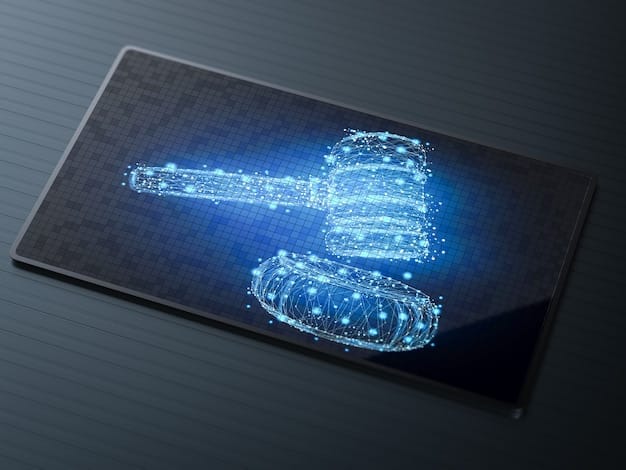AI Regulations Impact Entertainment: What You Need to Know

Alert: New regulations on AI-generated content are poised to reshape the entertainment industry, impacting content creation, copyright law, and the very definition of artistic expression in a digital age.
The entertainment industry is on the cusp of a significant transformation. Alert: New regulations on AI-generated content are being introduced, and these rules have the potential to dramatically alter how movies, music, games, and other forms of entertainment are created and distributed. It’s essential to understand these changes to navigate the evolving landscape.
Understanding the Impending Regulations on AI Content
The rise of artificial intelligence (AI) has led to an explosion of AI-generated content across various industries. To address the unique challenges and opportunities presented by this technology, regulatory bodies are starting to implement new rules. Understanding these regulations is crucial for anyone involved in the entertainment sector.
These regulations typically aim to clarify issues related to copyright, intellectual property, and transparency. Given the speed at which AI technology is advancing, policymakers are working to create frameworks that balance innovation with ethical considerations and the rights of creators.
Key Areas of Regulatory Focus
The regulatory landscape surrounding AI-generated content is complex and evolving. Here are some key areas that regulators are focusing on:
- Copyright and Ownership: Defining who owns the copyright to content created by AI is a central issue. Is it the AI’s creator, the user who prompted the AI, or someone else?
- Transparency Requirements: Many regulations are pushing for greater transparency, requiring that AI-generated content be clearly labeled as such.
- Liability and Accountability: Determining who is liable if AI-generated content infringes on existing copyrights or contains harmful information is another critical area.
Navigating these areas requires proactive engagement and a thorough understanding of the legal and ethical implications of using AI in content creation.

How the Entertainment Industry Currently Uses AI
AI has already permeated numerous aspects of the entertainment industry, enhancing efficiency, fostering creativity, and transforming traditional workflows. From scriptwriting to visual effects, AI tools are becoming indispensable assets for content creators.
Understanding the current applications of AI in entertainment provides a crucial backdrop for evaluating the impact of new regulations. Here are some of the prominent ways AI is being used today:
AI Applications in Entertainment
- Scriptwriting and Storyboarding: AI tools can assist in generating plot ideas, dialogue, and even entire scripts. They also aid in creating storyboards, helping filmmakers visualize scenes before production.
- Music Composition and Production: AI can compose original music, generate variations on existing themes, and assist in music production by automating tasks like mixing and mastering.
- Visual Effects and Animation: AI algorithms accelerate the creation of visual effects, automate animation processes, and enhance the realism of computer-generated imagery (CGI).
- Content Personalization and Recommendation: Streaming services and media platforms use AI to analyze user data and provide personalized content recommendations.
These are just a few examples, and the range of applications is continuously expanding. As AI becomes more integrated into these processes, the need for clear regulatory guidelines becomes increasingly apparent.
Impact on Film and Television Production
The film and television industries are poised to be significantly impacted by new regulations on AI-generated content. These regulations could reshape various aspects of production, from script development to post-production and distribution.
One of the primary concerns is how copyright laws will apply to AI-assisted creations. If an AI generates a significant portion of a script or visual effect, determining ownership and usage rights can become complex. This could lead to legal challenges and increased scrutiny of AI-generated content.

Potential Changes in Production Processes
Regulations may also lead to changes in how film and television productions operate on a day-to-day basis. Here are some possible shifts:
- Increased Transparency: Productions may need to disclose the extent to which AI was used in creating the content, ensuring viewers are aware of AI’s involvement.
- New Roles and Responsibilities: Compliance officers and legal experts may become integral members of production teams to navigate the regulatory landscape.
- Budgetary Considerations: Complying with regulations may require additional investment in legal counsel, AI auditing, and transparent labeling, impacting production budgets.
By adapting to these potential changes, the film and television industries can continue to innovate while adhering to ethical and legal standards.
How Music Industry Might Transform Under New AI Laws
The music industry stands to undergo a significant transformation as regulations on AI-generated content take effect. These regulations have the potential to reshape various aspects of music production, distribution, and artist compensation.
One of the primary concerns is how copyright laws will apply to AI-assisted music creation. If an AI generates a melody, lyrics, or even an entire song, determining ownership and usage rights can become complex. This could lead to legal challenges, especially regarding royalties and licensing agreements.
Potential Changes for Musicians
Musicians, producers, and record labels may need to adapt their practices to comply with new AI regulations. Here are some potential changes:
- Increased Collaboration: Artists may collaborate more closely with AI developers to ensure compliance and fair compensation.
- Transparency in Labeling: Music labels might be required to indicate the extent to which AI was involved in creating a song or album.
- New Revenue Models: The industry could explore new revenue models that account for AI’s role in music creation, possibly through micropayments or subscription services.
By proactively addressing these changes, the music industry can ensure that AI technologies are used ethically and sustainably, benefiting both artists and consumers.
Implications for Video Games and Interactive Media
The video game and interactive media industries are poised to be significantly impacted by new regulations on AI-generated content. These regulations could reshape various aspects of game development, from asset creation to gameplay design and user experience.
One of the primary concerns is how copyright laws will apply to AI-assisted game development. If an AI generates textures, character models, or entire levels, determining ownership and usage rights can become complex. This could lead to legal challenges and increased scrutiny of AI-generated content within games.
- New Game Design Approaches: Developers may adopt new approaches to game design that leverage AI in compliant and ethical ways.
- Enhanced User Experiences: AI can create more immersive and personalized gaming experiences.
- Transparency Requirements: Game developers might need to disclose the extent to which AI was used in creating assets or gameplay elements.
By proactively adapting to these changes, the video game and interactive media industries can continue to innovate while adhering to ethical and legal standards.
Navigating the Future of Entertainment with AI
As AI continues to evolve and regulations become more defined, the entertainment industry must navigate a complex landscape. Successful adaptation will require a balanced approach that embraces technological advancements while upholding ethical standards and legal compliance.
The key lies in fostering open discussions, exploring new business models, and implementing transparent practices. Collaboration between industry stakeholders, policymakers, and AI developers will be essential to creating a sustainable and equitable future for the entertainment industry.
The evolving landscape of AI regulation presents both challenges and opportunities. By staying informed, proactive, and adaptable, the entertainment industry can harness the power of AI to create innovative and engaging content while protecting the rights and interests of all stakeholders.
| Key Point | Brief Description |
|---|---|
| ⚖️ Regulatory Focus | Copyright, transparency, and accountability are key areas in AI content regulation. |
| 🎵 Music Transformation | AI laws may reshape music creation, artist compensation, and revenue models. |
| 🎬 Film Production | Film and TV may see increased transparency and new roles to ensure AI compliance. |
| 🎮 Gaming Impact | AI regulations could reshape game development, affecting asset creation and gameplay. |
FAQ
▼
The main concerns revolve around copyright ownership, ensuring transparency in AI usage, and clarifying accountability when AI-generated content leads to infringements or harm. These factors are essential for maintaining ethical standards.
▼
Complying with AI regulations may require additional investment in legal counsel, AI auditing, and transparent labeling, potentially increasing production costs. These costs are necessary to ensure compliance and ethical standards are met.
▼
Musicians might see increased collaboration with AI developers, more transparent labeling of AI usage in music, and the exploration of new revenue models that account for AI’s role in content creation and distribution.
▼
Game developers may need to adopt new design approaches that use AI ethically, provide transparent labeling of AI-created assets, and focus on user experiences that are enhanced by AI while respecting legal boundaries.
▼
Entertainment companies can stay informed on regulatory changes, engage in open discussions with policymakers and stakeholders, explore new business models, and implement transparent practices to balance innovation with compliance and ethical standards effectively.
Conclusion
The integration of AI into the entertainment industry is an undeniable force, bringing with it a wave of innovation and efficiency. However, the introduction of new regulations on AI-generated content marks a pivotal moment, requiring industry players to adapt and evolve. By understanding the implications of these regulations and embracing transparency, collaboration, and ethical practices, the entertainment industry can successfully navigate this changing landscape, ensuring a sustainable and equitable future for all stakeholders.





